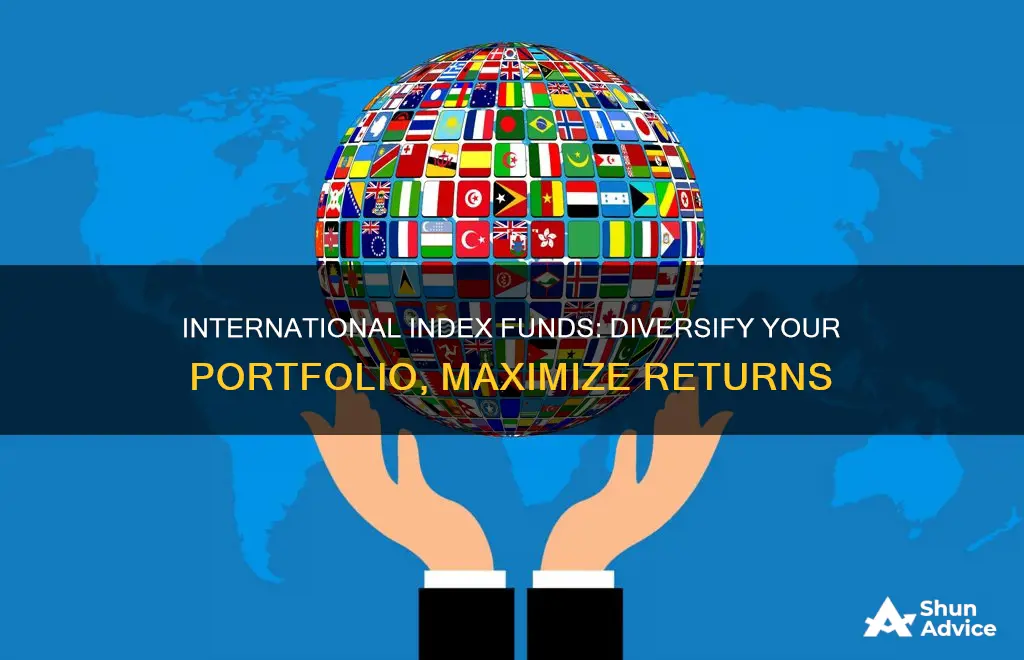
International index funds are a good way to diversify your portfolio and reduce reliance on domestic markets. They can also provide exposure to global economic growth, mitigate geopolitical risks and tap into industries not heavily represented domestically. While the US stock market has been dominant, there is a long history of throne-swapping between US and international stocks. In the early 2000s, for example, international stocks outperformed the US market. This wouldn't be the first time foreign stocks took the lead over their American counterparts.
What You'll Learn
- International stocks can provide a hedge against a weak US dollar
- They can offer exposure to sectors not heavily represented in the US
- They can be a good investment when the US market is struggling
- They can provide access to leading companies outside the US
- They can help investors avoid home-country bias

International stocks can provide a hedge against a weak US dollar
In addition to providing a hedge against a weak US dollar, international stocks can also offer valuable diversification to an investment portfolio. By investing in international stocks, investors can reduce their exposure to the risks associated with a single market, such as the US market. This diversification can help to smooth out volatility in investment returns and potentially enhance overall returns.
Furthermore, investing in international stocks allows investors to access different sector concentrations. For example, the US market has a high concentration of technology companies, while other markets, such as Europe, have a lower concentration in this sector. By investing in international stocks, investors can gain exposure to other sectors such as financials and commodities, which can further diversify their portfolios.
It is worth noting that investing in international stocks also comes with certain risks. Currency risk is one of the key considerations, as fluctuations in exchange rates can impact the value of investments. Additionally, international stocks may be more volatile and are subject to political and tax risks. However, by carefully evaluating these risks and implementing appropriate hedging strategies, investors can potentially mitigate these risks and benefit from the advantages of investing in international stocks.
In summary, international stocks can provide a hedge against a weak US dollar by boosting earnings for companies with international sales. They also offer diversification benefits, access to different sectors, and the potential for enhanced returns. While there are risks associated with international investing, these can be managed through careful evaluation and hedging strategies.
Smart Ways to Invest $1000 in Mutual Funds
You may want to see also

They can offer exposure to sectors not heavily represented in the US
International index funds can offer exposure to sectors that are not heavily represented in the US stock market. The US stock market is historically tech-heavy, with the S&P 500 being around 27% technology companies. In comparison, Europe's tech sector only makes up 7% of its market.
By investing in international index funds, investors can gain exposure to other sectors, such as financials and commodities in emerging markets. This diversification can add a layer of protection to an investment portfolio, particularly in today's challenging market environment.
The US stock market does not always dominate the global equity market. There have been sustained periods of outperformance by international markets, such as the ''lost decade' for US stocks that started in the early 2000s. From 2000 to 2009, the cumulative total return for the S&P 500 was negative 9.1% compared to a positive 30.7% for the MSCI All Country World Index ex-US.
Furthermore, the percentage of products and services produced or sold by S&P 500 companies outside the US has declined in the past decade. This means that relying solely on the S&P 500 for international exposure may not be sufficient.
By investing in international index funds, investors can access a wider range of sectors and reduce the risk of having all their investments in the US market, which can be beneficial during periods of US stock market underperformance.
Vanguard Mutual Funds: Choosing Wellesley or Wellington
You may want to see also

They can be a good investment when the US market is struggling
International index funds can be a good investment when the US market is struggling. This is because international stocks can provide diversification benefits and exposure to leading companies outside the United States.
Firstly, international stocks can be a good investment when the US market is struggling because they can act as a hedge against weakness in the US dollar. When the US dollar is strong, it tends to coincide with difficult economic conditions abroad. A strong dollar reduces the returns that US investors receive from foreign investments, as the profits of those companies are converted into fewer dollars. On the other hand, when the US dollar is weak, investors in international stocks benefit from stronger non-US currencies, which translate into higher returns when their profits are converted back into US dollars.
Secondly, international stocks can provide exposure to companies in industries that are not heavily represented in the US, such as basic materials. For example, by only owning US multinationals, investors will likely hold a lot of technology and healthcare firms but be underrepresented in other important parts of the global economy.
Thirdly, international stocks can be a good investment when the US market is struggling because they provide exposure to companies in emerging markets, which are generally considered riskier but offer more promising growth prospects. For example, growing middle-class populations in Africa, Latin America, the Middle East, and Asia are likely to propel some markets to greater annual GDP growth than the United States.
Finally, international stocks can provide diversification benefits by reducing an investor's reliance on the US market and spreading their risk across a wider range of companies and industries. This can help to smooth out volatility in investment returns and protect against downturns in the US market.
In summary, international index funds can be a good investment when the US market is struggling due to their potential to provide diversification benefits, exposure to global growth and industries not heavily represented in the US, and their ability to act as a hedge against a weak US dollar.
Money Market Funds: Where to Invest for Smart Returns
You may want to see also

They can provide access to leading companies outside the US
International index funds can provide access to leading companies outside the US, such as Nestle SA, Samsung Electronics, and Novo Nordisk. These funds offer diversification and exposure to global economic growth, industry representation, and geopolitical risk mitigation. They can also enhance returns, especially when the US market is struggling.
The US stock market does not always dominate the global equity market. There have been sustained periods of outperformance by international stocks, such as the "lost decade" for US stocks in the early 2000s. From 2000 to 2009, the cumulative total return for the S&P 500 was -9.1% compared to 30.7% for the MSCI All Country World Index ex-US.
International index funds provide access to leading companies in developed and emerging markets outside the US. For example, investors can gain exposure to companies like Taiwan Semiconductor, which is denominated in the New Taiwan dollar and trades on the Taiwan Stock Exchange, or Nordea bank, which trades in the Danish krone on Nasdaq Copenhagen.
By investing in international index funds, investors can access a broader range of sectors and industries. The US market is heavily weighted towards technology companies, which make up about 27% of the S&P 500. In contrast, Europe has a lower allocation to technology, at about 7%. International index funds provide exposure to other sectors, such as financials and commodities, which are more heavily represented in emerging markets.
In summary, international index funds provide access to leading companies outside the US, enhancing diversification, exposure to global growth, and potentially improving returns. They offer a way to invest in developed and emerging markets, providing access to a broader range of sectors and industries.
Investment Funds vs Savings Accounts: Where Lies the Risk?
You may want to see also

They can help investors avoid home-country bias
Investing in international index funds can help investors avoid home-country bias, which is a tendency to favour domestic securities over foreign ones. This bias stems from investors' familiarity with domestic stocks and companies, as well as a perception that domestic stocks carry less risk.
However, by only investing in their home country, investors are ignoring a significant portion of the global equity market. For example, while the United States currently represents 60% of the global equity market, investors with a home bias are ignoring the remaining 40%.
International index funds can provide investors with exposure to this other 40% of the market, reducing their over-reliance on domestic markets and enhancing their returns. This is particularly important given that the US stock market does not always dominate the global equity market. There have been sustained periods of outperformance by international markets, such as the 'lost decade' for US stocks that started in the early 2000s.
Additionally, US multinational companies tend to represent certain parts of global industries and not others. For example, by only owning US multinationals, investors will likely end up holding a lot of technology and healthcare firms but be underrepresented in other important parts of the global economy, such as basic materials.
International index funds can, therefore, provide investors with exposure to a wider range of industries and help them avoid home-country bias.
Best Vanguard Funds for Your IRA: Top Picks
You may want to see also
Frequently asked questions
While the U.S. market has been on a tear lately, it's important to remember that markets are cyclical, and the U.S. market doesn't always dominate. There have been periods, like the 'lost decade' from 2000-2009, where international stocks have outperformed U.S. stocks. By investing in international index funds, you can take advantage of these periods when they occur and reduce your overall risk through diversification.
International index funds offer diversification benefits by reducing your reliance on the U.S. market and providing exposure to other regions and industries. They can also act as a hedge against weakness in the U.S. dollar, as they are often denominated in other currencies. Additionally, international index funds give you access to some of the world's leading companies, such as Nestle, Samsung, and Novo Nordisk.
Investing in international markets comes with higher risks due to factors such as currency movements, political conflicts, and weaker accounting standards. International stocks have also been more volatile than U.S. stocks in recent years. Additionally, some argue that investing in U.S. multinational companies provides enough international exposure since they derive a significant portion of their revenue from overseas markets.







